Affiliate links on Android Authority may earn us a commission. Learn more.
The Withings Scanwatch Light is a smartwatch for those who don't want one
December 9, 2023
Despite more than a decade of improvement, today’s best smartwatches still come with two important caveats: a design that rarely looks like a regular watch and a one- or two-day battery life at best. If the reason you haven’t gotten a smartwatch is because you don’t want either of those constraints, you should look at Withings and its line-up.
I’ve been eying the wearable and health company for a couple of years now. Withings’ regular-watch-plus-small-display approach intrigued me, and so did the promised 30 days of battery life. After all, 80% of my “smart” Pixel Watch 2 usage is as a notification screen, so could I give up on some of the extra features that I only use 20% of the time in exchange for better battery life? And what would it be like to live with a more basic smartwatch that actually looked and behaved like a regular watch?
Those are the questions I wanted to answer with the Withings ScanWatch Light, the latest middle-range smartwatch and activity tracker. On paper, the ScanWatch Light does most of what I need. I’ve been wearing it for a couple of weeks now, and this is what I learned.


Withings ScanWatch Light specs
| Withings ScanWatch Lite | |
|---|---|
Display | 0.63-inch OLED 16-bit Grayscale color 282ppi |
Dimensions and weight | 37mm case 18mm band 27.1g without band |
Build materials | Stainless steel case and crown Gorilla Glass display |
Battery | Up to 30 days in smartwatch mode 2-hour charging time |
IP rating | 5ATM |
Sensors | TempTech24/7 Module High Dynamic Range Accelerometer Multi-wavelength PPG 16 channels Altimeter |
Connectivity | Bluetooth LE |
Compatibility | Android 9 and higher iOS 15 and higher |
Measurements | - Steps - Active minutes - Sleep (with quality score) - Exercise tracking (40+ types) - Average heart rate - Workout heart rate zones - HRV (coming in Q4 2023) - Respiratory rate (coming in 2024) |
Other features | - High/low heart rate notifications - Breathing disturbances detection - Manual menstrual cycle tracking - Breathing exercises - Manual cycle tracking - Timer, stopwatch, alarm - Activity reminders |
It lasts and lasts and lasts (but only if…)
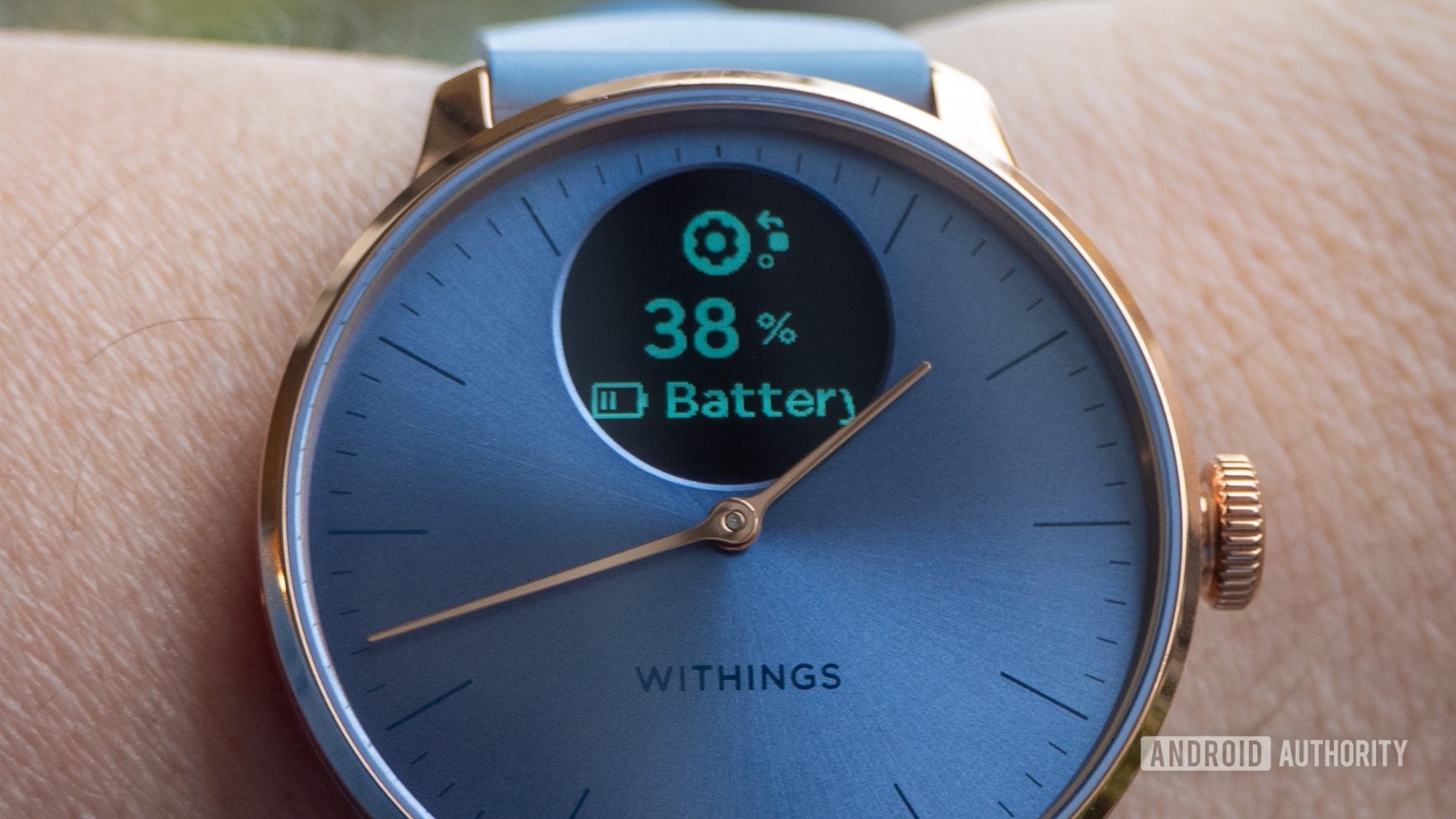
The last time I charged the ScanWatch Light was November 22. I am writing this now on December 4 and I’m only down to 38% battery. At this rate, I can easily make it until December 10, if not more, on a single charge. Granted, that’s a little less than the ideal 30 days of battery life, but I’ve enabled most features, including notifications (WhatsApp, calls, messages), automatic respiratory scans, activity reminders, and automatic activity detection.
I could stretch the battery life further if I disabled some of these, but then what would be the point? I’d much rather get 20 useful days with my watch than 30 useless ones.
20 days of battery life is incredibly freeing. This ruined other smartwatches for me.
And 20 days is still, by a mile, better than what the Pixel Watch 2, Galaxy Watch 6, or Apple Watch Series 9 offer. We’re in fitness tracker territory here, and the ScanWatch Light can last as much as the best of them.
This, however, comes with the caveat that I disabled the Quicklook (raise to wake) function. When I had that enabled, the battery plummeted fast and hard — about 10-15% per day. Granted, that’d still get you 6-10 days of longevity, but I wanted more.
Honestly, this aspect of the ScanWatch Light ruined other smartwatches for me. I don’t have to think about charging it and I don’t have to carry the charging adapter with me on weekends or vacations.
I could even tempt faith and go home to Lebanon for two full weeks without taking the charger along. The thought of jumping between four different homes without worrying about this little piece of plastic getting lost or forgotten somewhere is absolutely freeing. I don’t worry about losing a phone charger or cable because everyone has USB-C gear. But proprietary chargers for smartwatches are a pain.
Just enough screen, but not enough smarts
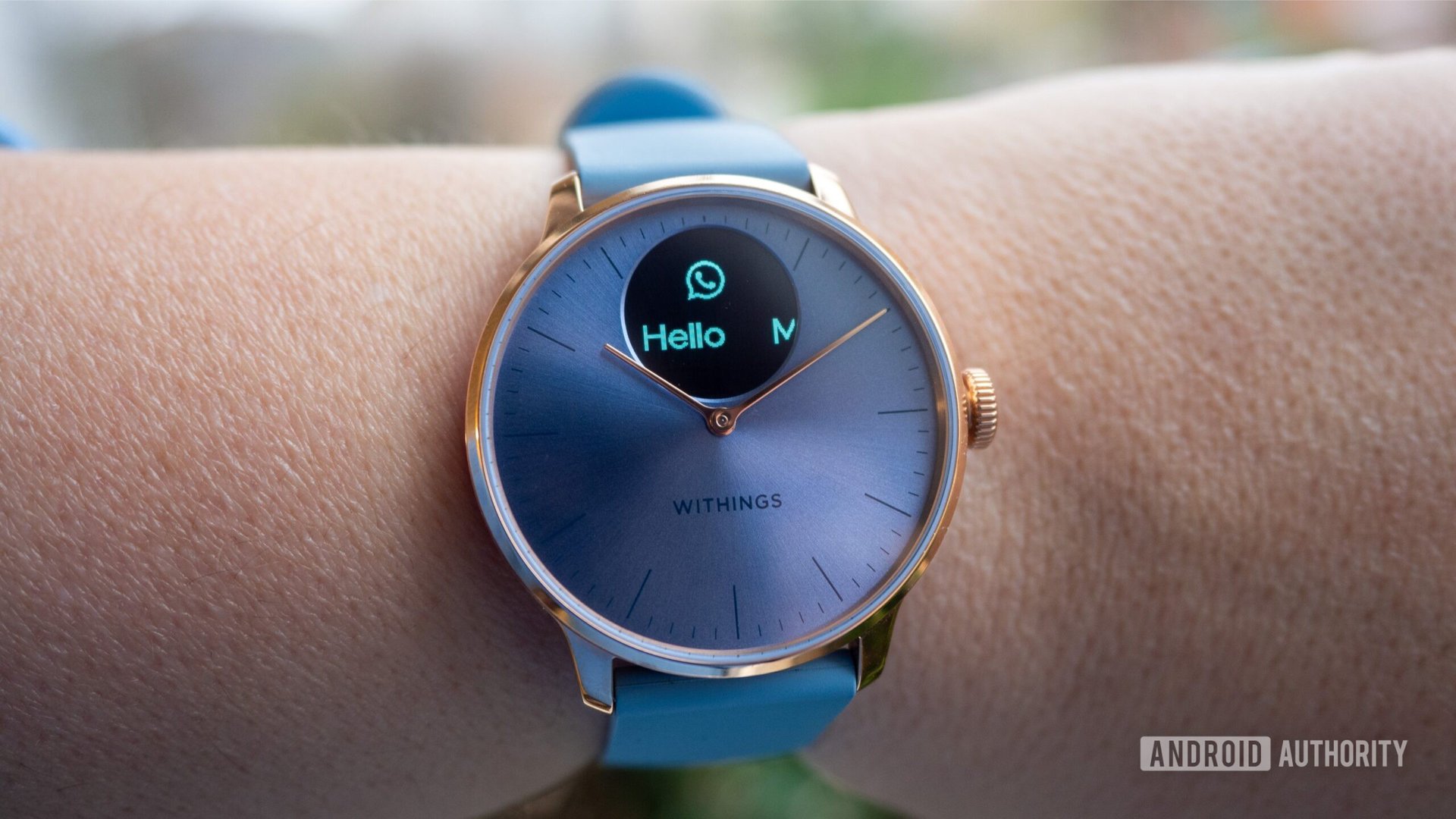
The price of that lengthy battery life is a tiny 0.63-inch greyscale OLED display. Everything you need to see shows up there, so you have to manage your expectations. At best, you get three lines of icons and text. Notifications scroll sideways to let you read the entire text. You can’t see your heart rate and steps on the same screen, but you can scroll between both with the crown. If you’re in the middle of a walk, you have to scroll between different screens to check the duration, distance, pace, and current heart rate.
All in all, things work well within the confines of that tiny display. Everything Withings chose to implement is implemented in a smart way. I won’t pretend like the switch from the Pixel Watch 2’s larger and colorful display to this small thumb-sized screen didn’t affect me, but after a couple of days, I was used to its limitations.
Besides, it’s not like this is the smartwatch for fitness gurus and elite athletes who need all the stats and all the info, nor is it the super smartwatch for those who use apps and take calls from their wrist. The ScanWatch Light is more of an overall health tracker that also happens to act as a fitness and exercise tracker.
Everything works well within the confines of the tiny display, but I found myself missing walking directions and music controls.
However, I admit that I personally found myself missing two crucial smart features from my Pixel Watch 2: navigation directions and music controls. If notifications are 80% of my smartwatch use case, Google Maps walking directions and Spotify controls are a big part of the remaining 20%. I had no idea how much I’d gotten used to accessing them on my wrist and I got annoyed each time I wanted to check the next turn or repeat the current song only to realize I couldn’t do it from the ScanWatch Light.
I also missed all the ecosystem features Google has implemented between its watches and phones. My Pixel Watch 2 and Pixel 8 Pro have synchronized alarms, bedtime modes, and do not disturb settings. It’s a minor feature that transforms the watch from a separate entity to an integral and seamless part of my setup. With the ScanWatch Light, I have to enable everything separately.
It’s a watch first, a fitness tracker second
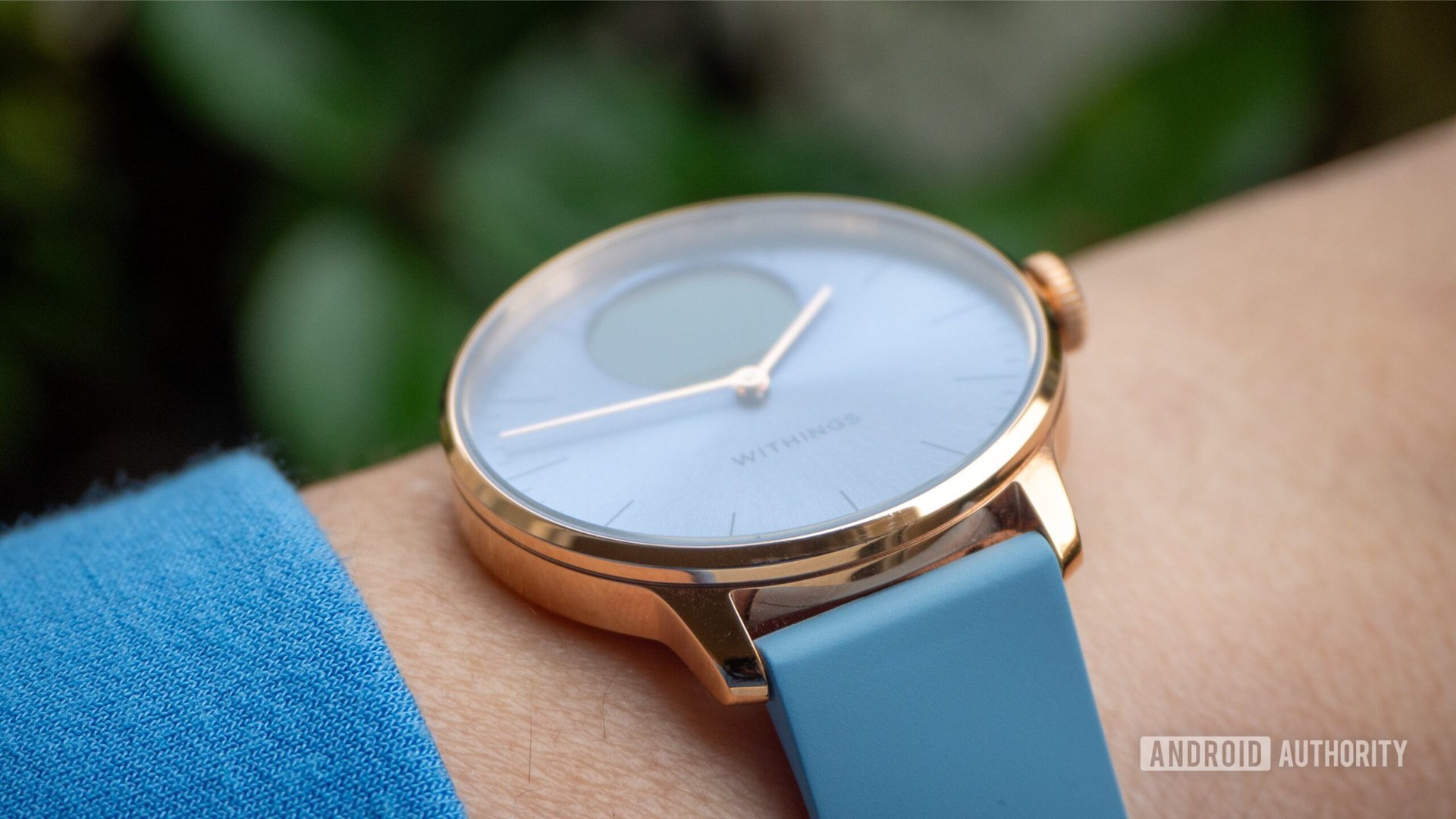
In the eternal debate of which smartwatches do and don’t look like a real watch, Withings’ line-up is clearly ahead of everyone else. These are watches. They look like watches. They have static dials, hour and minute hands, slim profiles, and no unnecessary black bezels. And the ScanWatch Light looks especially nice in this blue and rose gold mix that I’m testing.
But there’s clearly something different here, and it’s not just the black display in the middle. A bump houses three sensors on the bottom. And, unlike any other analog watch, the hour and minute dials momentarily spin to a 10:10 position to clear up the display. You can see it in the right screenshot below, where it’s 3:00 PM but the hands say 10:10.
Under the hood, the ScanWatch Light is an advanced fitness tracker. It measures steps, sleep, heart rate, automatically detects four exercises (walk, run, cycle, swim), and actively tracks more than 40 types of workouts (like basketball, padel, skiing, weightlifting, yoga, and more). It can notify you of unexpected low and high heart rates, and it keeps tabs on any breathing disturbances while sleeping. There’s on-the-watch cycle tracking plus symptom input for headaches, acne, breast tenderness, cramps, and more. Withings also promised night-time heart rate variability detection and respiratory rate measures, but those will be coming in future software updates.
The watch also integrates with the Withings app and its full ecosystem of connected gadgets, like weight scales, blood pressure monitors, sleep trackers, and thermometers. If Garmin was the extreme athlete version of a smartwatch ecosystem, Withings would be the extreme health-nut version. The ScanWatch Light is a great start for those who care about their health in general, while the rest of the ecosystem is there for those who want to take health tracking to the next level.
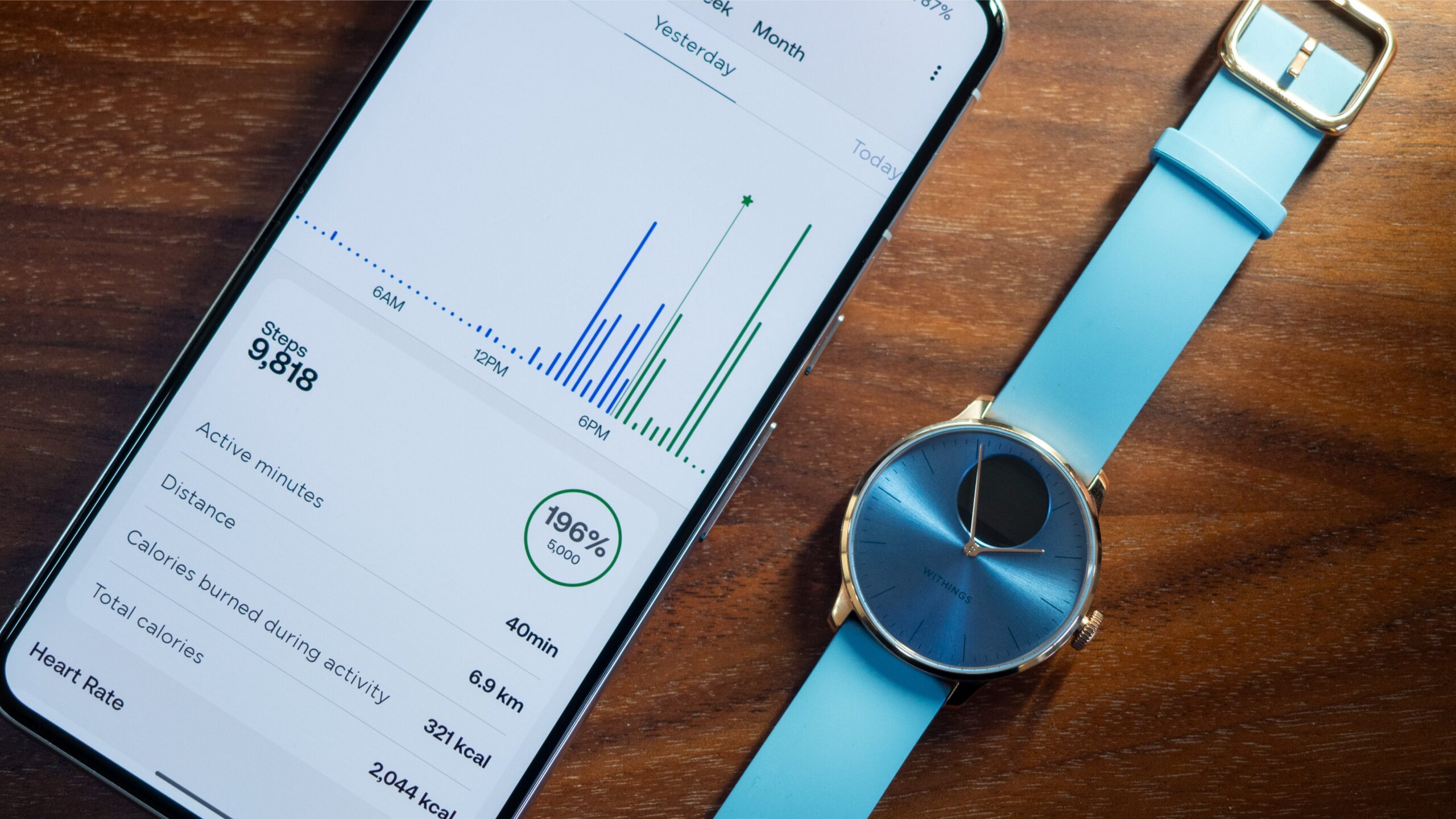
Putting aside my own needs and wants for extra smarts (navigation, music controls, and synchronized alarms and do not disturb settings), the only thing I find myself faulting the ScanWatch Light at is the lack of Afib and irregular heartbeat detection. If the goal is to have a health tracker first, then why miss out on the one truly life-saving feature that could help you avoid strokes and heart failures? You’d have to get the older ScanWatch or newer ScanWatch 2 to benefit from that.
Other than this misstep, I think the ScanWatch Light is near perfect for its intended market. And if you’re still young and healthy, then you probably don’t care about Afib enough for it to be a deal-breaker. $250 hits a sweet spot where you can almost consider this a fancy analog watch, and where all the smarts and tracking come as extras.
Withings has clearly carved itself a niche in the smartwatch segment and is walking mostly alone in it. I’ve been so impressed by the approach that I decided to buy my parents, aunt, and mother-in-law four smartwatches (€880 on Black Friday) so they can keep a tab on their health. But I opted for the older ScanWatch instead of the Light, because I care about Afib detection. If that isn’t a glowing endorsement of Withings’ approach, I don’t know what is.

Elegant watch design
Great activity tracker

Long-lasting battery
Clinically validated health sensors
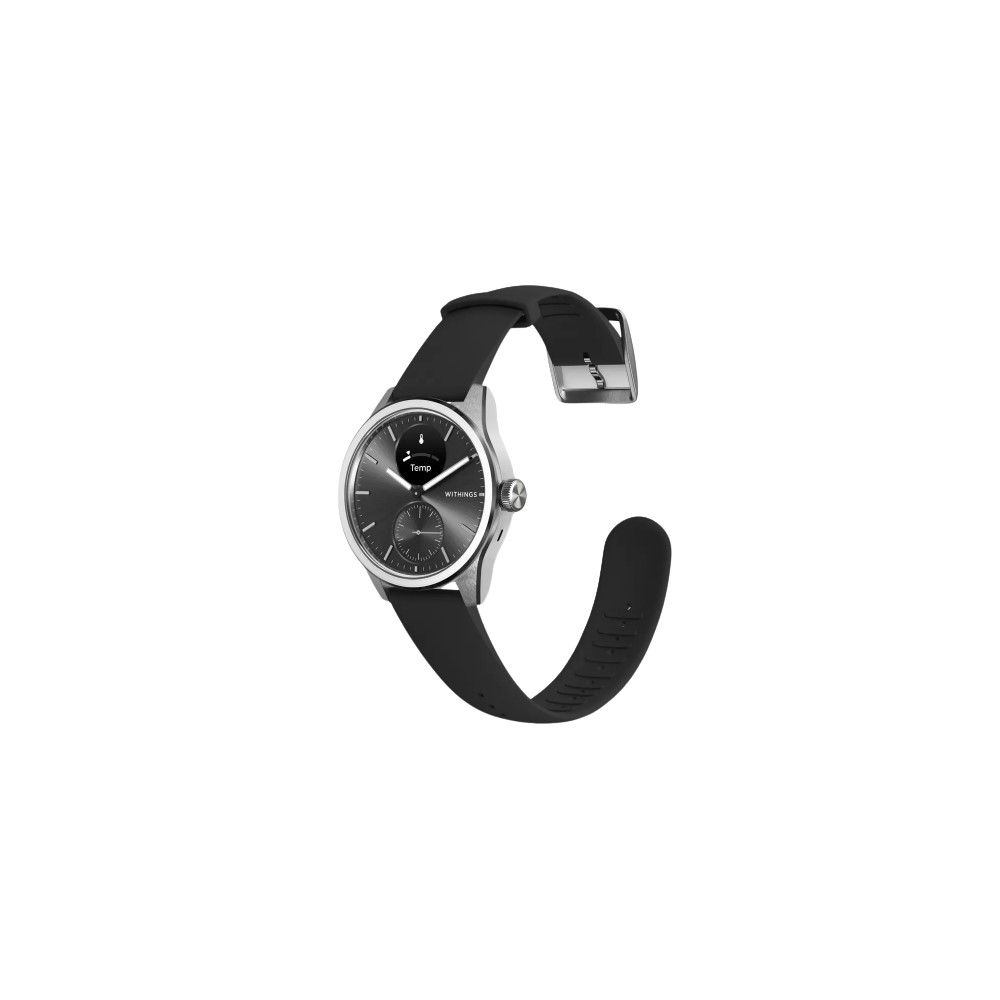
Up to 30-day battery life
Broad health tracking tools